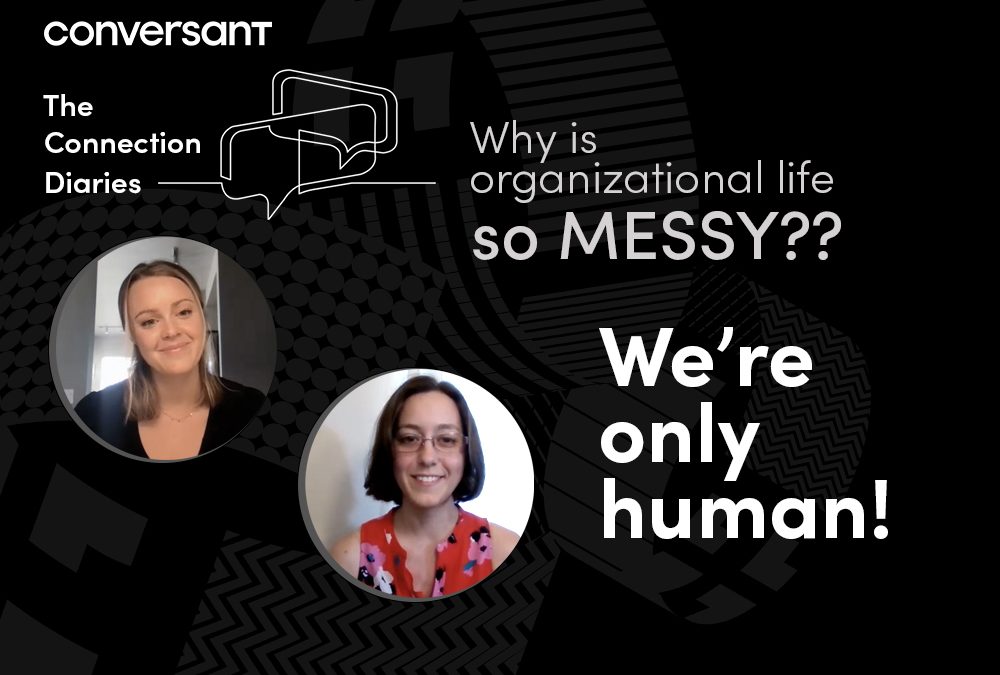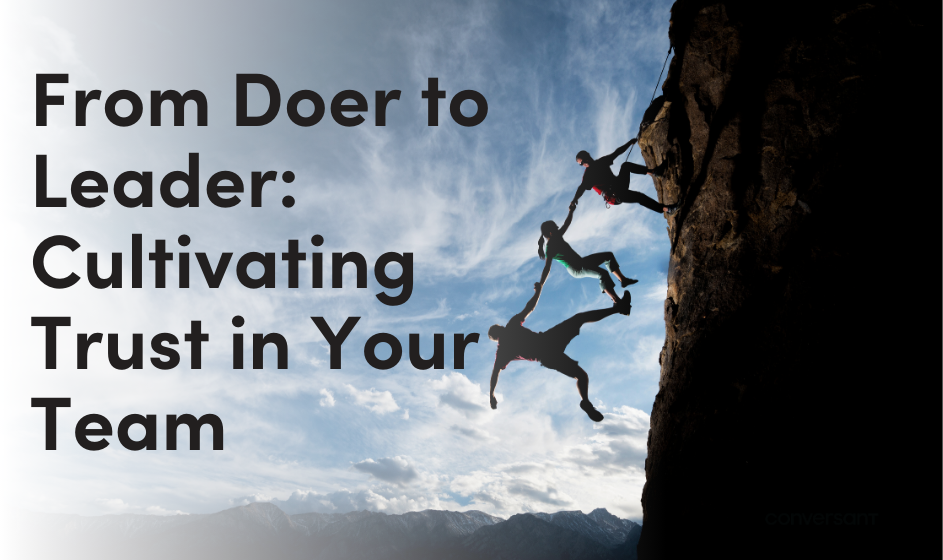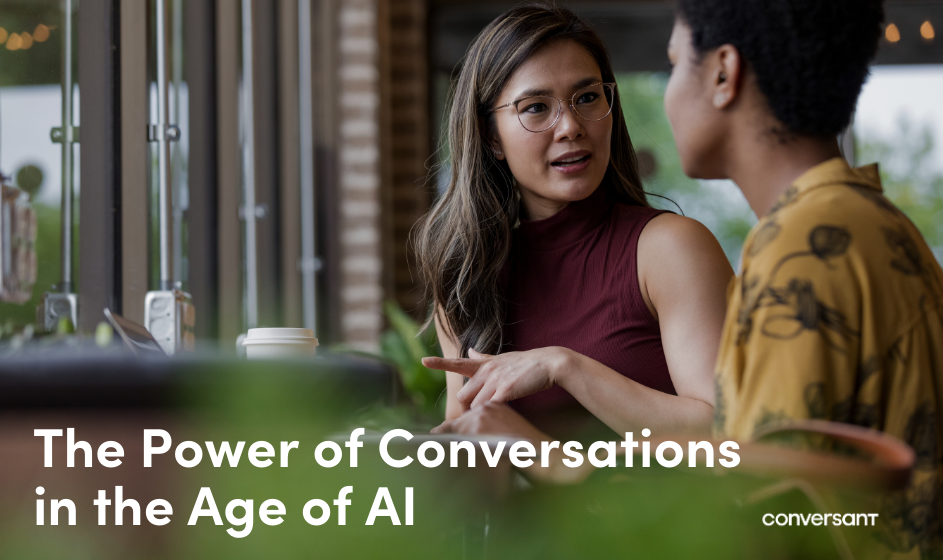
Why is organizational life so messy? We’re only human! | The Connection Diaries
Organizations are systems of human beings. It’s a simple and seemingly obvious fact, but we forget it all the time. While we strive to perfect our organizational structures and processes, it’s easy to think mechanically and ignore all the messy human things like interpersonal relationships, emotions, and communication. Whether you pay attention to it or not, it is affecting your business. How can we become more aware of the human side of our organizations and work with it instead of against it?
Emma Rose Connolly and Katie Mingo share their thoughts on why the “human” side of organizational life is not only important, but critical to business success.
Read Katie’s blog: Leave the Robotics Behind: Bringing More Humanity to Work
You can find a full transcript of this video below. Explore all past episodes of The Connection Diaries here or on our YouTube channel, and don’t forget to connect with us on LinkedIn.
Full Transcript
Emma Rose: Welcome back to another episode of the Connection Diaries. This month I’m joined by Katie Mingo, and I asked her to come chat with me because I was inspired by her blog that she wrote for this month—which if you are getting this video through the newsletter, you’ll have already seen the headline for it—but it’s about leaving robotics behind and embracing humanity in your systems. And it made me think, we talk about human being so crucial to business—the concept of humanity. And we’ve put it in our vision statement that’s recently been developed, and we talk about it as core to everything we do in all of our tools, but I don’t think we’ve ever really talked about it in this forum, what we mean by that. Like, why do we think human systems, the human side of organizations, is so critically important to business success? So, Katie, what do you think? Why do we talk about this all the time, and why does it matter?
Katie: Emma Rose, this is a great—this is such a great topic. It is true that we talk we say the word human or humanity so often, and we say that all of our—all of our principles, all of the work that we do has to be consistent with the nature of being human. That’s a criteria for everything that we develop and anything new that we try, and the things that have stood the test of time over the history of the company. And I think, in a sentence, it’s because organizations and businesses are made up of human beings. That’s the fact that it seems so obvious and still so easy to forget in the midst of technology, in the midst of formal-sounding titles and company names that aren’t human names, necessarily. And so that’s the bare fact of it, and something that we bring out all the time and keep having to remind our clients and ourselves that we are all just networks and communities of human beings in organizations.
Emma Rose: Yeah.
Katie: And I think one thing that we’ve talked about a lot recently is that, why do we focus on conversation? And so I wanted to just say a little bit about that. And so the logic flow for me is that if we are networks of human beings, those connections between humans is what has us create value in the world, and the only medium that we have for those connections is conversation. So Emma Rose, what else—what else makes human being important for you?
Emma Rose: Well, yeah, I think it came up earlier this week with our colleagues, and then Patrick, our co-worker, he ended up posting on LinkedIn about it, so I think it struck a chord with everyone that our work is inherently messy, and organizational life is inherently messy. And there’s this assumption—and I think you allude to this, kind of the history of it in your blog (so, another plug, go read it everyone)— that organizational life should be perfectly manicured and ordered, and the process should be pristine and should always get us the results that we want. And unfortunately, we tend to about 99.9 percent of the time fall short of that intention. And because we work in that domain with helping leaders and the people in their organizational systems communicate and work better together and create more value, our work is messy. And so, how do we start being a little bit more—a little bit more upfront with our clients about that? That this is a—this hard work. It’s not easy. But with commitment, it is the thing that will produce the highest value and sustainability in your organization. And yeah, I just think that human beings are messy, I mean, anybody who has—if you think about your home life, nobody would say that their home and family life is pristine and process-oriented and… and yet, we expect the same people to go into these other contexts and be completely controlled and productive and effective. And I think that’s so interesting that we still have that separation, and we’re the same people showing up; we’re actually carrying all that messiness from home into our work life, and I’ve been reflective lately as well just hearing friends share about their experience with their leaders in their organizations, that that human messiness that comes up, even when it’s not directly related to the work necessarily, it’s the interpersonal stuff—annoyance, frustration, rumors going around, people complaining behind the scenes, all that stuff. It does affect your work and it does affect your organization and the bottom line, but a lot of leaders don’t want to play with that. They don’t want to take responsibility for engaging with that mess.
Katie: It’s so true. There is—there is no switch that we turn on at eight or nine a.m. in the morning and turn off when we go home or spend time with our friends and family. I love that, and it’s really in that awareness that you’re talking about, that that messiness does exist, and that we do have to make a choice about what to do with it. There’s a social psychologist, and I love the metaphor he uses of the rider and the elephant, and he talks about—his name is Jonathan Height, and he talks about the elephant being our emotional side and our emotional being, and it makes these split-second decisions, and it has the strength to just be on autopilot and rush off without the rider’s approval or knowledge. And without that awareness of what we’re doing emotionally and physically, we often create these justifications for why we’re upset or annoyed, and that never really matches the reality like you’re talking about. It never really—those seemingly logical excuses never quite match up the real cause of the issue. I think that’s another thing for us to be aware of, and at Conversant we talk about being present to, is just how are we showing up and what things do seem unpredictable or what things are taking us by surprise, and how do we recover from that and turn it into something valuable.
Emma Rose: Right, well and I think, like you said, all of our tools are designed for the nature of being human. It’s—they’re really meant to drive more awareness, right, to be your partner in, where are we relative to where we want to be, and what’s our track to getting back to that, but a lot of that takes personal responsibility. You know, we—it seems, too, that we tend to—when we start getting off-track or start feeling that disconnection with other people, we almost drive more disconnection in defense or in an effort to not to avoid the discomfort. And yet, that’s just worsening our chances of accomplishing what we want to accomplish. And so, where are those moments of awareness to start seeing where can I communicate better, who do I need to communicate with, and in what way and about what in order to get us back to where we want to be? But it’s not easy. It’s never easy.
Katie: No, no.
Emma Rose: Even for those of us who have been in this work for a really long time, some in our organization for many, many, many moons, they’re not perfect either, I can tell you.
Katie: Exactly. One of our colleagues, Kell Delaney, likes to say that we’re all—each conversation, each interaction is brand new, and we’re all beginners at this particular one. So, I think that that is a humbling thought to leave us with.
Emma Rose: It is humbling. Well Katie, thank you so much for this short little conversation with me. Like I said, please go check out her blog this month, some practical tips on how to bring a little bit more humanity into work. And we will see you next month.



